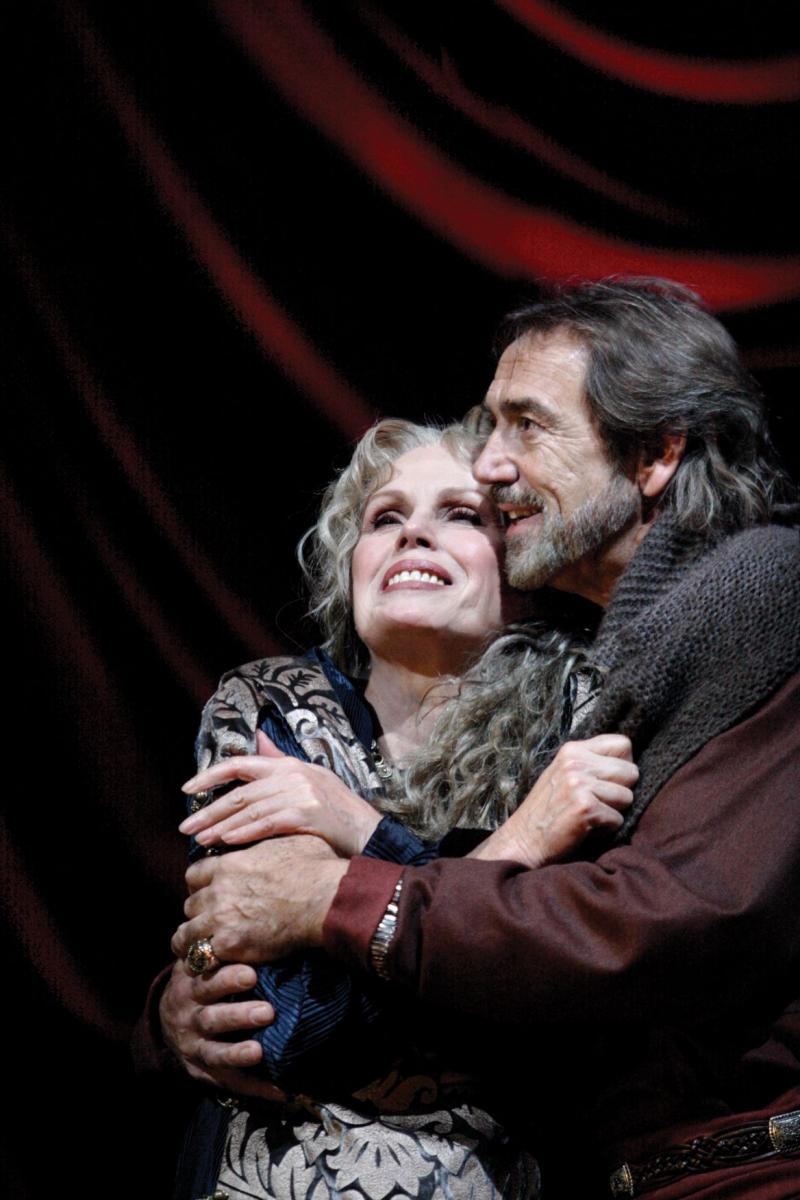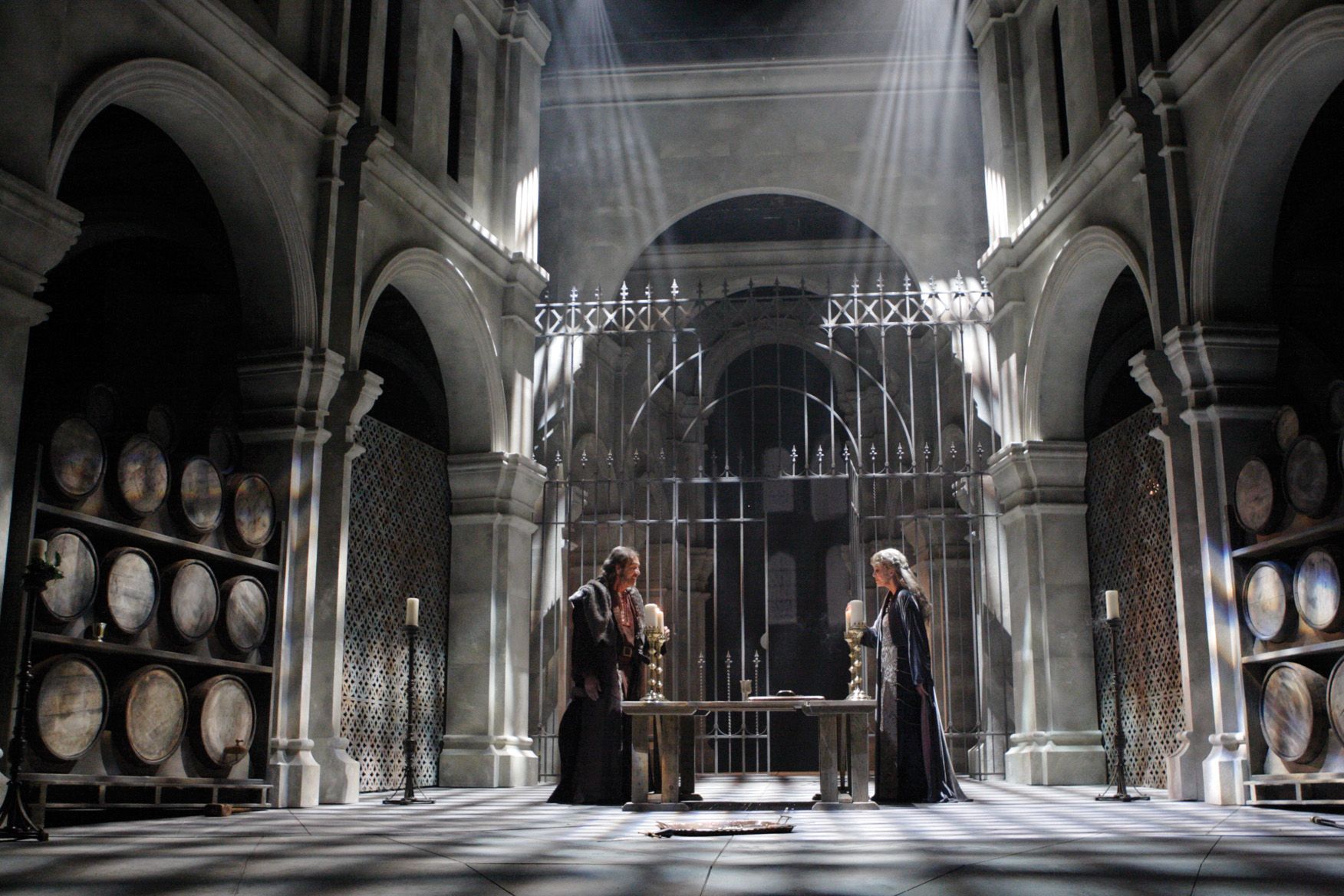The Lion in Winter, Theatre Royal, Haymarket | reviews, news & interviews
The Lion in Winter, Theatre Royal, Haymarket
The Lion in Winter, Theatre Royal, Haymarket
Plantagenet lite: Robert Lindsay and Joanna Lumley face off in historical work of fiction

Don't be misled by the mini-history lesson with which Trevor Nunn's belated London stage premiere of The Lion in Winter begins, a sequence of dates, facts and maps that scroll up a decoratively appointed screen and threaten to turn the sumptuous Haymarket Theatre (Nunn's home now across four productions) into an upscale schoolroom.
Sound like pulpy fun? Goldman's factually sourced "fiction" (his word) is up to a point, especially when Robert Lindsay's Henry is roaring away centre stage amidst the outsized architecture of Stephen Brimson Lewis's sets (pictured below). But after a while it becomes impossible to square this petulant, preening assemblage - Joanna Lumley's Eleanor seems to be preparing for her close-up in some reprise of Nunn's staging of Sunset Boulevard - with the weighty personages of historical lore. Hell, there's more actual gravitas to the TV clan from Lindsay's popular sitcom My Family than is evident from a quintet given over to remarks like, "Hush dear, mother's fighting," that even Patsy Stone might find just a shade too camp.
 That's not to say that the material demands undue sobriety but, rather, that its jokiness may come as a considerable surprise to those familiar only with the 1968 film, which won Oscars for Katharine Hepburn and for Goldman himself even though the play's original 1966 Broadway production ran little more than 10 weeks. (Enough, however, to net a Best Actress Tony for its leading lady, the great Rosemary Harris.) Essentially an opportunity for thespian flair and grandstanding that rises or falls on the strength of its leads, The Lion in Winter offers every opportunity for style to eclipse substance. The writing itself is frequently daft: why would a 12th-century monarch cite some bloke called Lear when Shakespeare's play was 422 years away? On the other hand, given that he goes on to reference Medea after the interval, perhaps Henry II made Geoffrey of Monmouth - a roughly contemporaneous source of the Lear tale - his bedtime reading: at last, a king who knows his theatre!
That's not to say that the material demands undue sobriety but, rather, that its jokiness may come as a considerable surprise to those familiar only with the 1968 film, which won Oscars for Katharine Hepburn and for Goldman himself even though the play's original 1966 Broadway production ran little more than 10 weeks. (Enough, however, to net a Best Actress Tony for its leading lady, the great Rosemary Harris.) Essentially an opportunity for thespian flair and grandstanding that rises or falls on the strength of its leads, The Lion in Winter offers every opportunity for style to eclipse substance. The writing itself is frequently daft: why would a 12th-century monarch cite some bloke called Lear when Shakespeare's play was 422 years away? On the other hand, given that he goes on to reference Medea after the interval, perhaps Henry II made Geoffrey of Monmouth - a roughly contemporaneous source of the Lear tale - his bedtime reading: at last, a king who knows his theatre!
In fact, plenty here suggests that Lindsay might make quite a good Lear, given the growly command with which he sweeps about the stage. Raging at his sons as "three whiskered things" (Lear isn't much kinder to his daughters), Henry tears into the recriminations and resentments in which the play traffics in-between verbal jousts. "You look like Doomsday," he snarls at Eleanor, which may not be a kind thing to say to a self-harming, incarcerated spouse who spends inordinate amounts of time staring into the mirror. The actor's physical looseness, too, rescues the part from the marmoreal aspect that Laurence Fishburne brought to the same role in The Lion in Winter's last Broadway revival, in 1999. There's a discernible spring in Lindsay's step that the play at its most faux-hip - a fleeting homoerotic encounter included - would do well to emulate.
 The same doesn't necessarily apply to the rest of the cast, though Tom Bateman (pictured to the right of James Norton and Joseph Drake as his brothers) possesses both the stature and fire for Richard the Lionheart, mum's favourite son. I'm not sure anyone could lend credibility to Goldman's infantilising view of daddy's boy John, himself the subject of a Shakespeare play all his own, and one after a while feels for that fine young actor Joseph Drake having to bounce around the stage as if on an invisible trampoline. (Geoffrey, the third son, barely registers through no fault of James Norton, the actor playing him.) As the French King, Philip, who lures Richard into his bedchamber, Rory Fleck-Byrne has style and dash and is spared the more insipid passages that beset Sonya Cassidy, who plays Princess Alais, Philip's sister and Henry's mistress. Oh, and Richard's would-be wife.
The same doesn't necessarily apply to the rest of the cast, though Tom Bateman (pictured to the right of James Norton and Joseph Drake as his brothers) possesses both the stature and fire for Richard the Lionheart, mum's favourite son. I'm not sure anyone could lend credibility to Goldman's infantilising view of daddy's boy John, himself the subject of a Shakespeare play all his own, and one after a while feels for that fine young actor Joseph Drake having to bounce around the stage as if on an invisible trampoline. (Geoffrey, the third son, barely registers through no fault of James Norton, the actor playing him.) As the French King, Philip, who lures Richard into his bedchamber, Rory Fleck-Byrne has style and dash and is spared the more insipid passages that beset Sonya Cassidy, who plays Princess Alais, Philip's sister and Henry's mistress. Oh, and Richard's would-be wife.
The principal sticking point is Lumley, returning to a ramped-up equivalent of the regal environs that brought her to the West End and Broadway last season in La bête. (In that, she played a 17th-century princess.) Entering the fray like an elaborately garbed Lady Bracknell, she gets the japery of the part perfectly well without ever cracking open the gracious hauteur to get to the hurt underpinning the shoutier passages that make the last half-hour or so of the production such a slog. "We're jungle creatures," Eleanor says, insisting more than once on the barbarism that lies beneath the barbs. But without a leading lady willing to go for the jugular, Goldman's play comes off as a faded jeu d'esprit, less an ageless battle of wills between the sexes than an essay in Plantagenet lite.
- The Lion in Winter at the Theatre Royal, Haymarket, until 28 January, 2012
rating
Explore topics
Share this article
Add comment
The future of Arts Journalism
You can stop theartsdesk.com closing!
We urgently need financing to survive. Our fundraising drive has thus far raised £49,000 but we need to reach £100,000 or we will be forced to close. Please contribute here: https://gofund.me/c3f6033d
And if you can forward this information to anyone who might assist, we’d be grateful.

Subscribe to theartsdesk.com
Thank you for continuing to read our work on theartsdesk.com. For unlimited access to every article in its entirety, including our archive of more than 15,000 pieces, we're asking for £5 per month or £40 per year. We feel it's a very good deal, and hope you do too.
To take a subscription now simply click here.
And if you're looking for that extra gift for a friend or family member, why not treat them to a theartsdesk.com gift subscription?
more Theatre
 Troilus and Cressida, Globe Theatre review - a 'problem play' with added problems
Raucous and carnivalesque, but also ugly and incomprehensible
Troilus and Cressida, Globe Theatre review - a 'problem play' with added problems
Raucous and carnivalesque, but also ugly and incomprehensible
 Clarkston, Trafalgar Theatre review - two lads on a road to nowhere
Netflix star, Joe Locke, is the selling point of a production that needs one
Clarkston, Trafalgar Theatre review - two lads on a road to nowhere
Netflix star, Joe Locke, is the selling point of a production that needs one
 Ghost Stories, Peacock Theatre review - spirited staging but short on scares
Impressive spectacle saves an ageing show in an unsuitable venue
Ghost Stories, Peacock Theatre review - spirited staging but short on scares
Impressive spectacle saves an ageing show in an unsuitable venue
 Hamlet, National Theatre review - turning tragedy to comedy is no joke
Hiran Abeyeskera’s childlike prince falls flat in a mixed production
Hamlet, National Theatre review - turning tragedy to comedy is no joke
Hiran Abeyeskera’s childlike prince falls flat in a mixed production
 Rohtko, Barbican review - postmodern meditation on fake and authentic art is less than the sum of its parts
Łukasz Twarkowski's production dazzles without illuminating
Rohtko, Barbican review - postmodern meditation on fake and authentic art is less than the sum of its parts
Łukasz Twarkowski's production dazzles without illuminating
 Lee, Park Theatre review - Lee Krasner looks back on her life as an artist
Informative and interesting, the play's format limits its potential
Lee, Park Theatre review - Lee Krasner looks back on her life as an artist
Informative and interesting, the play's format limits its potential
 Measure for Measure, RSC, Stratford review - 'problem play' has no problem with relevance
Shakespeare, in this adaptation, is at his most perceptive
Measure for Measure, RSC, Stratford review - 'problem play' has no problem with relevance
Shakespeare, in this adaptation, is at his most perceptive
 The Importance of Being Earnest, Noël Coward Theatre review - dazzling and delightful queer fest
West End transfer of National Theatre hit stars Stephen Fry and Olly Alexander
The Importance of Being Earnest, Noël Coward Theatre review - dazzling and delightful queer fest
West End transfer of National Theatre hit stars Stephen Fry and Olly Alexander
 Get Down Tonight, Charing Cross Theatre review - glitz and hits from the 70s
If you love the songs of KC and the Sunshine Band, Please Do Go!
Get Down Tonight, Charing Cross Theatre review - glitz and hits from the 70s
If you love the songs of KC and the Sunshine Band, Please Do Go!
 Punch, Apollo Theatre review - powerful play about the strength of redemption
James Graham's play transfixes the audience at every stage
Punch, Apollo Theatre review - powerful play about the strength of redemption
James Graham's play transfixes the audience at every stage
 The Billionaire Inside Your Head, Hampstead Theatre review - a map of a man with OCD
Will Lord's promising debut burdens a fine cast with too much dialogue
The Billionaire Inside Your Head, Hampstead Theatre review - a map of a man with OCD
Will Lord's promising debut burdens a fine cast with too much dialogue

Comments
While I generally agree with